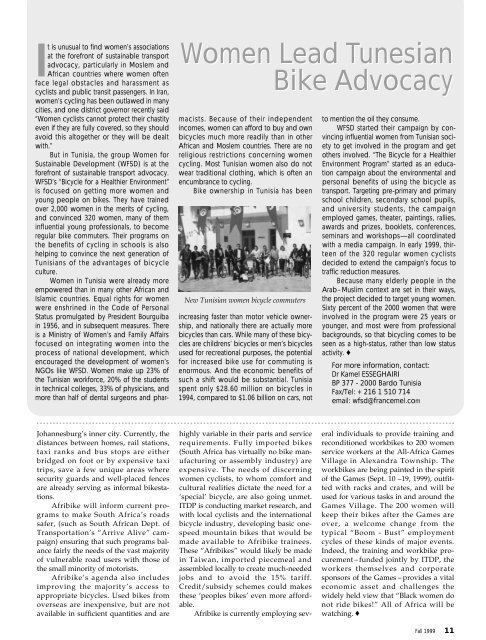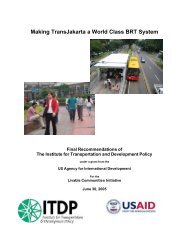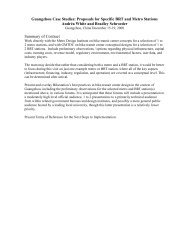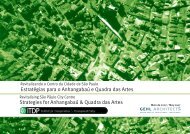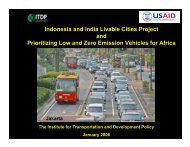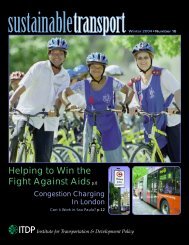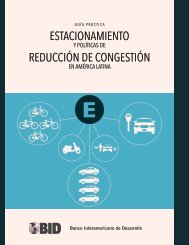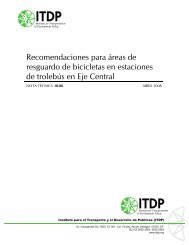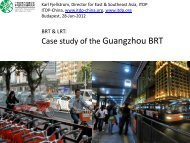Download PDF - ITDP | Institute for Transportation and Development ...
Download PDF - ITDP | Institute for Transportation and Development ...
Download PDF - ITDP | Institute for Transportation and Development ...
You also want an ePaper? Increase the reach of your titles
YUMPU automatically turns print PDFs into web optimized ePapers that Google loves.
Women Lead Tunesian<br />
Bike Advocacy<br />
It is unusual to find women’s associations<br />
at the <strong>for</strong>efront of sustainable transport<br />
advocacy, particularly in Moslem <strong>and</strong><br />
African countries where women often<br />
face legal obstacles <strong>and</strong> harassment as<br />
cyclists <strong>and</strong> public transit passengers. In Iran,<br />
women’s cycling has been outlawed in many<br />
cities, <strong>and</strong> one district governor recently said<br />
“Women cyclists cannot protect their chastity<br />
even if they are fully covered, so they should<br />
avoid this altogether or they will be dealt<br />
with.”<br />
But in Tunisia, the group Women <strong>for</strong><br />
Sustainable <strong>Development</strong> (WFSD) is at the<br />
<strong>for</strong>efront of sustainable transport advocacy.<br />
WFSD’s “Bicycle <strong>for</strong> a Healthier Environment”<br />
is focused on getting more women <strong>and</strong><br />
young people on bikes. They have trained<br />
over 2,000 women in the merits of cycling,<br />
<strong>and</strong> convinced 320 women, many of them<br />
influential young professionals, to become<br />
regular bike commuters. Their programs on<br />
the benefits of cycling in schools is also<br />
helping to convince the next generation of<br />
Tunisians of the advantages of bicycle<br />
culture.<br />
Women in Tunisia were already more<br />
empowered than in many other African <strong>and</strong><br />
Islamic countries. Equal rights <strong>for</strong> women<br />
were enshrined in the Code of Personal<br />
Status promulgated by President Bourguiba<br />
in 1956, <strong>and</strong> in subsequent measures. There<br />
is a Ministry of Women’s <strong>and</strong> Family Affairs<br />
focused on integrating women into the<br />
process of national development, which<br />
encouraged the development of women’s<br />
NGOs like WFSD. Women make up 23% of<br />
the Tunisian work<strong>for</strong>ce, 20% of the students<br />
in technical colleges, 33% of physicians, <strong>and</strong><br />
more than half of dental surgeons <strong>and</strong> pharmacists.<br />
Because of their independent<br />
incomes, women can af<strong>for</strong>d to buy <strong>and</strong> own<br />
bicycles much more readily than in other<br />
African <strong>and</strong> Moslem countries. There are no<br />
religious restrictions concerning women<br />
cycling. Most Tunisian women also do not<br />
wear traditional clothing, which is often an<br />
encumbrance to cycling.<br />
Bike ownership in Tunisia has been<br />
New Tunisian women bicycle commuters<br />
increasing faster than motor vehicle ownership,<br />
<strong>and</strong> nationally there are actually more<br />
bicycles than cars. While many of these bicycles<br />
are childrens’ bicycles or men’s bicycles<br />
used <strong>for</strong> recreational purposes, the potential<br />
<strong>for</strong> increased bike use <strong>for</strong> commuting is<br />
enormous. And the economic benefits of<br />
such a shift would be substantial. Tunisia<br />
spent only $28.60 million on bicycles in<br />
1994, compared to $1.06 billion on cars, not<br />
to mention the oil they consume.<br />
WFSD started their campaign by convincing<br />
influential women from Tunisian society<br />
to get involved in the program <strong>and</strong> get<br />
others involved. “The Bicycle <strong>for</strong> a Healthier<br />
Environment Program” started as an education<br />
campaign about the environmental <strong>and</strong><br />
personal benefits of using the bicycle as<br />
transport. Targeting pre-primary <strong>and</strong> primary<br />
school children, secondary school pupils,<br />
<strong>and</strong> university students, the campaign<br />
employed games, theater, paintings, rallies,<br />
awards <strong>and</strong> prizes, booklets, conferences,<br />
seminars <strong>and</strong> workshops—all coordinated<br />
with a media campaign. In early 1999, thirteen<br />
of the 320 regular women cyclists<br />
decided to extend the campaign’s focus to<br />
traffic reduction measures.<br />
Because many elderly people in the<br />
Arab - Muslim context are set in their ways,<br />
the project decided to target young women.<br />
Sixty percent of the 2000 women that were<br />
involved in the program were 25 years or<br />
younger, <strong>and</strong> most were from professional<br />
backgrounds, so that bicycling comes to be<br />
seen as a high-status, rather than low status<br />
activity. ♦<br />
For more in<strong>for</strong>mation, contact:<br />
Dr Kamel ESSEGHAIRI<br />
BP 377 - 2000 Bardo Tunisia<br />
Fax/Tel: + 216 1 510 714<br />
email: wfsd@francemel.com<br />
Johannesburg’s inner city. Currently, the<br />
distances between homes, rail stations,<br />
taxi ranks <strong>and</strong> bus stops are either<br />
bridged on foot or by expensive taxi<br />
trips, save a few unique areas where<br />
security guards <strong>and</strong> well-placed fences<br />
are already serving as in<strong>for</strong>mal bikestations.<br />
Afribike will in<strong>for</strong>m current programs<br />
to make South Africa’s roads<br />
safer, (such as South African Dept. of<br />
<strong>Transportation</strong>’s “Arrive Alive” campaign)<br />
ensuring that such programs balance<br />
fairly the needs of the vast majority<br />
of vulnerable road users with those of<br />
the small minority of motorists.<br />
Afribike’s agenda also includes<br />
improving the majority’s access to<br />
appropriate bicycles. Used bikes from<br />
overseas are inexpensive, but are not<br />
available in sufficient quantities <strong>and</strong> are<br />
highly variable in their parts <strong>and</strong> service<br />
requirements. Fully imported bikes<br />
(South Africa has virtually no bike manufacturing<br />
or assembly industry) are<br />
expensive. The needs of discerning<br />
women cyclists, to whom com<strong>for</strong>t <strong>and</strong><br />
cultural realities dictate the need <strong>for</strong> a<br />
‘special’ bicycle, are also going unmet.<br />
<strong>ITDP</strong> is conducting market research, <strong>and</strong><br />
with local cyclists <strong>and</strong> the international<br />
bicycle industry, developing basic onespeed<br />
mountain bikes that would be<br />
made available to Afribike trainees.<br />
These “Afribikes” would likely be made<br />
in Taiwan, imported piecemeal <strong>and</strong><br />
assembled locally to create much-needed<br />
jobs <strong>and</strong> to avoid the 15% tariff.<br />
Credit/subsidy schemes could makes<br />
these ‘peoples bikes’ even more af<strong>for</strong>dable.<br />
Afribike is currently employing several<br />
individuals to provide training <strong>and</strong><br />
reconditioned workbikes to 200 women<br />
service workers at the All-Africa Games<br />
Village in Alex<strong>and</strong>ra Township. The<br />
workbikes are being painted in the spirit<br />
of the Games (Sept. 10 –19, 1999), outfitted<br />
with racks <strong>and</strong> crates, <strong>and</strong> will be<br />
used <strong>for</strong> various tasks in <strong>and</strong> around the<br />
Games Village. The 200 women will<br />
keep their bikes after the Games are<br />
over, a welcome change from the<br />
typical “Boom - Bust” employment<br />
cycles of these kinds of major events.<br />
Indeed, the training <strong>and</strong> workbike procurement<br />
–funded jointly by <strong>ITDP</strong>, the<br />
workers themselves <strong>and</strong> corporate<br />
sponsors of the Games – provides a vital<br />
economic asset <strong>and</strong> challenges the<br />
widely held view that “Black women do<br />
not ride bikes!” All of Africa will be<br />
watching. ♦<br />
Fall 1999 11


